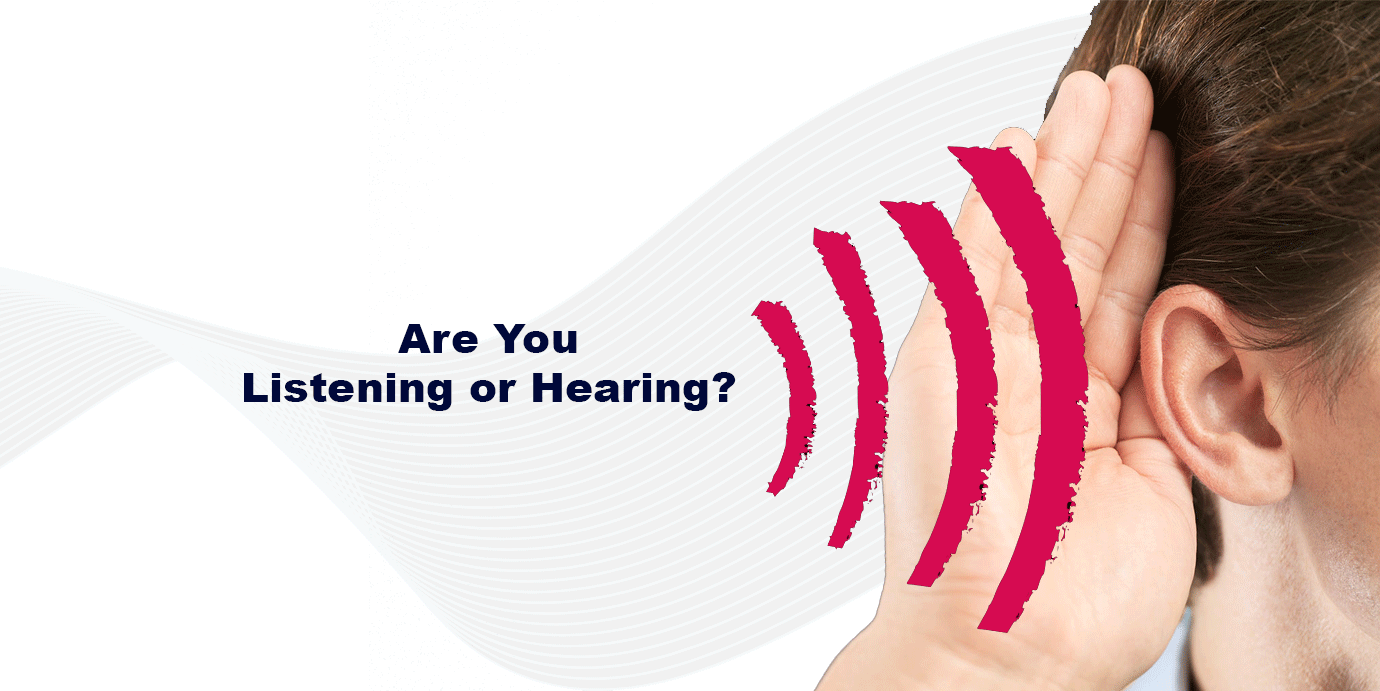We all are aware about the phenomenal and inspirational three monkeys of the great Mahatma Gandhi. One of them covering his eyes (symbolizing See no Evil), second one covering his ears (symbolizing Hear no Evil) and the third one covering his mouth (symbolizing Speak no Evil). Contemplating with a different perspective, nature has made it possible for us to close our eyes or mouth anytime we wish to do so, merely without using our hands. But this does not stand true for our ears. Anything good or bad, whether we wish or not, we get to hear it. Even though after covering our ears using the hands, we just cannot stop the sound entering our ears.
Hearing Vs. Listening
The act of hearing is more like collecting data. It involves the involuntary action of perceiving sound. Listening, on the other hand, is voluntary as it demands hearing with thoughtful attention. Listening is the ability to accurately receive and interpret messages in the communication process. Listening means paying attention not only to the story, but how it is told, the use of language and voice and how the other person uses his or her body. In other words, it means being aware of both verbal and non-verbal messages.
In our everyday life we have to listen to a lot of things, right from listening to our parents, spouse and kids, boss, colleagues and clients to the railway announcements, instructions given while travelling, news headlines, sports commentary etc. Listening skills are a vital part of good communication. If you have good listening skills, you can start to improve relationships not only at your home but at the workplace as well as in the society. Developing good listening habits can help to ensure you understand the information correctly, interpret messages accurately and optimize your conversations and communications efficiently as well as leading you to effective decision making.
Importance of Listening
- Improve performance – Listening carefully will help you to accurately follow the directions. By listening closely to directions, guidelines and requirements, you may be able to avoid errors and improve your processes.
- Positive relationships – Good listening can help you to build and maintain positive relationships at the workplace with your co-workers as well as with customers. Showing interest when communicating with others can help you build trust and develop long-term, mutually beneficial professional relationships. Good listening can help you prevent misunderstandings between co-workers, perform your duties accurately and anticipate the needs of your customers.
- Learning new skills – Effective listening is an important way to help you grasp new skills. By listening closely to the advice, guidance and directions of your mentors or supervisors, you may be able to learn new skills and advance your range of capabilities.
Ways to Improve Listening Skills
- Paying utmost attention – Distractions can make it difficult to focus on the things a speaker is telling you. In order to become a good listener, limit as many distractions as possible and provide the speaker with your undivided attention. This includes silencing your phone, turning off your computer and avoiding the urge to multitask by checking emails or giving your attention to other tasks. This can help you focus on the speaker and make sure that you grasp everything that they talk about.
- Keeping an open mind – Our personal filters, assumptions, judgments, and beliefs can distort what we hear. Ensuring you receive all information without being bias can help you remain open to the messages and perspectives of your speaker. Even if you have a strong opinion about the topic of conversation, setting aside your opinions in order to receive your speaker’s message without judgement can help you consider new possibilities and innovative perspectives.
- Clarifying – An important part of active listening is asking questions when you need clarification. Clarifying aspects of the conversation can indicate you are intently listening and provide you with an opportunity to confirm your understanding.
- Showing and being engaged – Use your own body language and gestures to show that you are engaged. Nod occasionally, smile and use other facial expressions, make sure that your posture is open and interested, encourage the speaker to continue with small verbal comments like ‘’yes’’, ‘’okay’’ etc.
- Opening conversation – Being a good listener often includes opening a dialogue and allowing for a conversation to start between you and the speaker. Set the conversation in pace by determining the goal of the speaker’s message and evaluating their body language to decide when it is appropriate for you to respond with your own input. Instead of rushing to fill silences, provide time for the speaker to finish their thoughts and acknowledge their message accordingly. This will also give you the time to absorb their message and process what they are saying before it is time for you to respond.
- Meaningful questioning – The questions you ask should be meaningful and establish your investment in the speaker’s message. Ask questions that can help both you and the speaker reflecting what they say as well as elaborating the points that may need extra clarification. The questions might help the speaker remember other things they wanted to say or open a new line of dialogue that will be worth exploring.
- Summarizing – Restating key points and summarizing content is an effective skill that can contribute to your ability to practice active listening. In the workplace, summarizing can help both parties confirm they understand next steps and responsibilities.
We should not just hear to our co-workers, clients to reply them but always try to listen carefully to understand and arrive at a solution. Good listening skills can lead to better client satisfaction, greater productivity with fewer mistakes and increased sharing of information that in turn can lead to more creative and innovative work.





